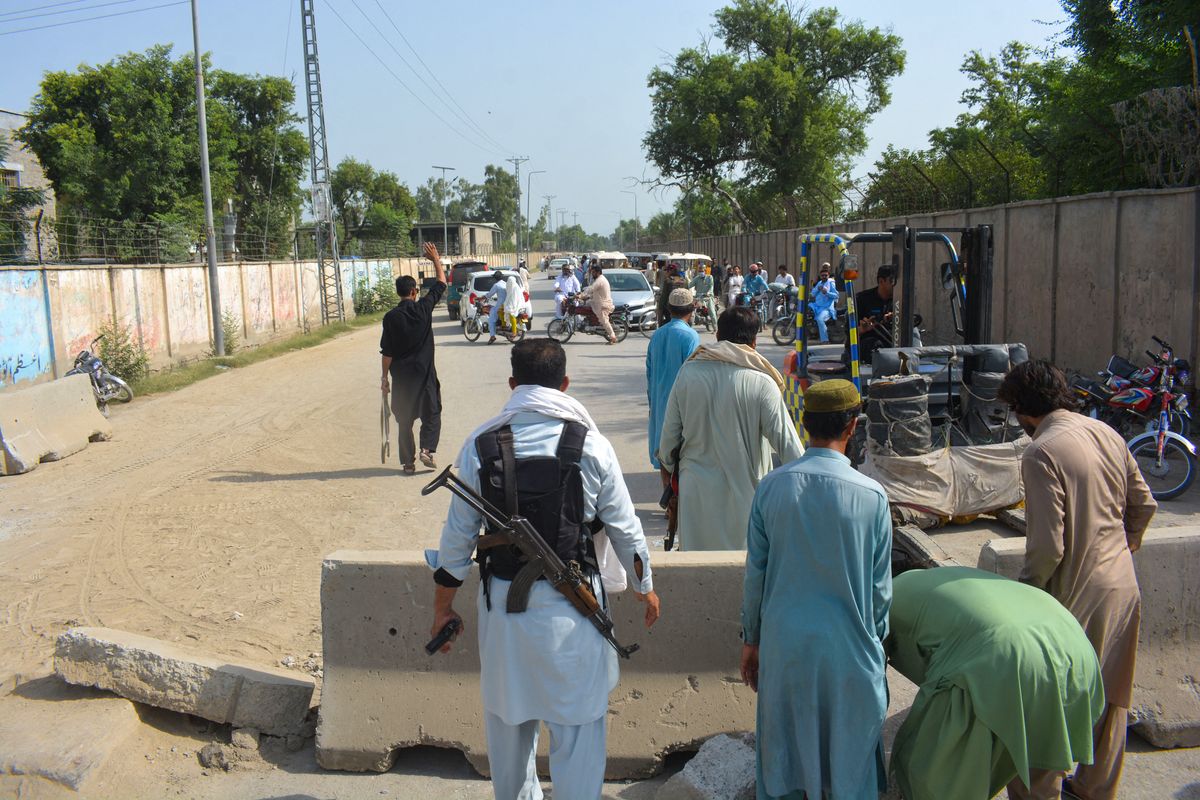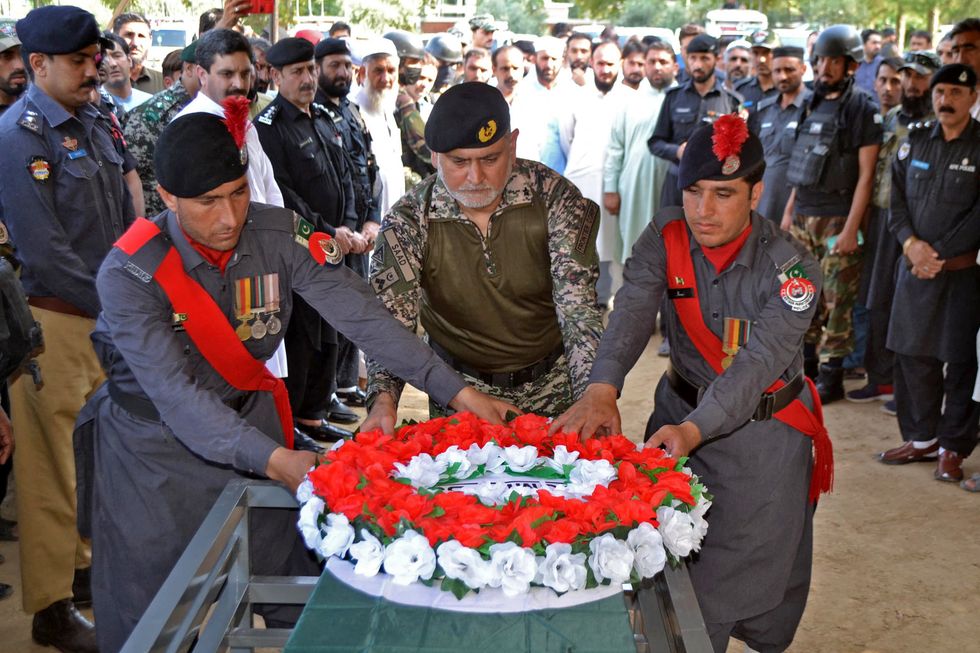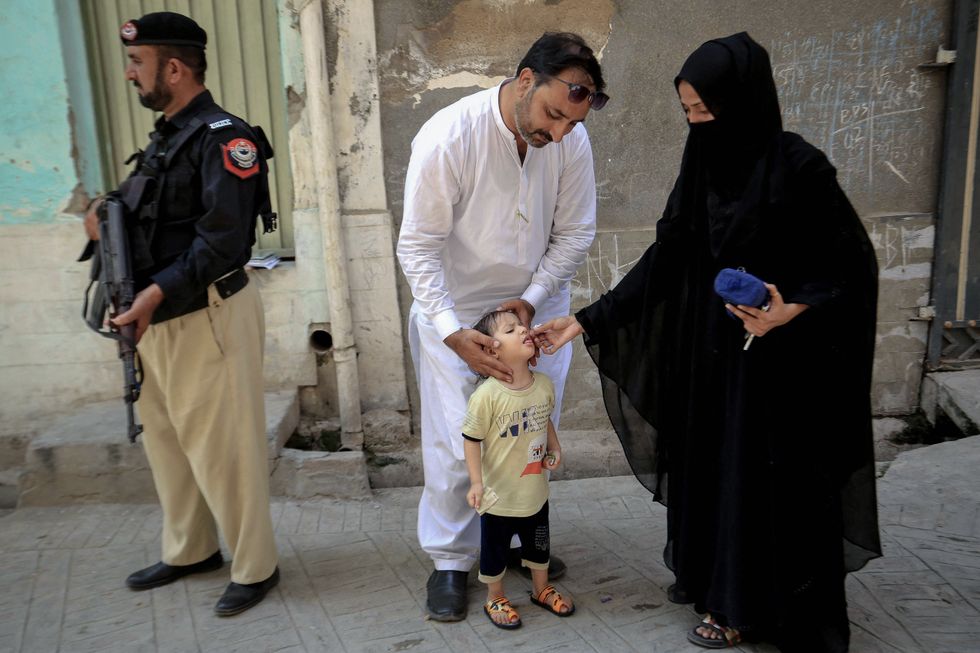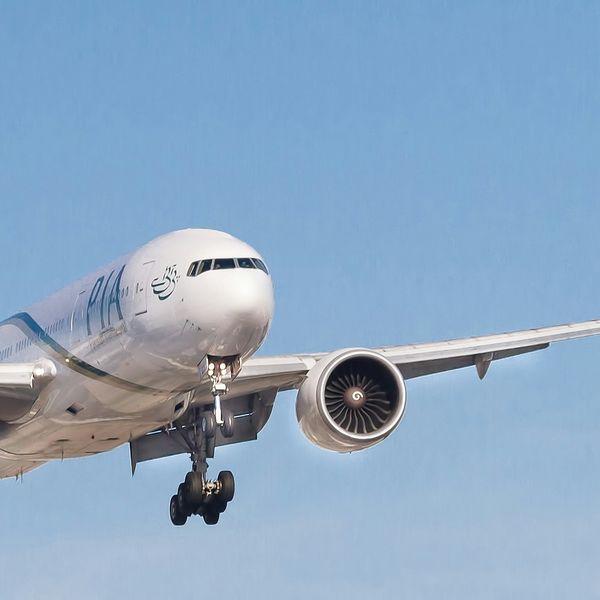Why are Lakki Marwat policemen protesting?
Police in Khyber Pakhtunkhwa protest attacks, blocking Indus Highway to demand military exit and civilian control

Zain Ul Abideen
Senior Producer
Zain Ul Abideen is an experienced digital journalist with over 12 years in the media industry, having held key editorial positions at top news organizations in Pakistan.

Pakistan's security personnel block a street to protest against the demise of a slain policeman who was killed in an attack by gunmen, in Bannu on September 12, 2024.
AFP
Police officers in Pakistan’s Khyber Pakhtunkhwa province have launched an unprecedented protest, demanding the military’s withdrawal and a transfer of power to civilian law enforcement.
The protests erupted after a wave of attacks on police, which left many officers dead, while the government remained silent.
In Lakki Marwat, police blocked the main Indus Highway in a sit-in that began on Monday and continued into its fourth day as of Thursday. The protest stranded thousands of travelers moving between Khyber Pakhtunkhwa, Sindh, and Balochistan, leading to hours-long delays on the key road.
In Bajaur district, police announced a boycott of an ongoing anti-polio campaign following the killing of a police officer. Policemen there vowed to hold a grand meeting on Thursday to develop a strategy for further action.
ALERT: Bajaur District police, Khyber Pakhtunkhwa has announced boycotting duties for Anti-Polio Campaigns because of police consistently being targeted and killed while protecting polio eradicating teams.
Policemen from at least three Southern Districts of Khyber Pakhtunkhwa are…
— The Khorasan Diary (@khorasandiary) September 11, 2024
The protest comes after consistent attacks on police personnel, particularly those assigned to protect polio vaccination teams.

Khyber Pakhtunkhwa has experienced escalating violence, with 29 terrorist attacks in August alone, claiming 25 lives. According to police data, at least 75 police officers have been killed in targeted attacks and ambushes across the province so far in 2024.
ALERT: Unidentified men blew up the Hujra (guesthouse) of the police sub-inspector Ghulam Muhammad Khan, leading the police protest in Lakki Marwat district by exploding a bomb in the early hours of the morning: Police pic.twitter.com/7LKEB7SBiy
— The Khorasan Diary (@khorasandiary) September 12, 2024
In the district of Lakki Marwat, which borders the tribal areas near Afghanistan, Taliban-linked militants have frequently targeted police officers, security personnel, and government officials. This border region is known for its volatile security situation, and police are often on the front lines of conflict.

Former National Assembly member and leader of the National Democratic Movement (NDM), Mohsin Dawar, supported the protesting officers, stating that they were voicing their grievances over terrorism and the military’s perceived failure to protect them.
Police personnel in Lakki Marwat are protesting against terrorism & attacks targeting police,they are demanding accountability & expressing grievances against the military establishment.The protest is gaining support from police of other districts,making it an unprecedented event pic.twitter.com/tfy0S9HZOs
— Mohsin Dawar (@mjdawar) September 10, 2024
“These police officers are holding the military establishment accountable and calling for civilian control,” Dawar said in a statement on X, formerly known as Twitter. He added that the protest is gaining momentum, with officers from neighboring districts joining in, making it a historic event.
As of Thursday, no resolution has been reached between the police and government officials.
Meanwhile, Khyber Pakhtunkhwa Chief Minister Ali Amin Gandapur announced his intention to send a delegation to Afghanistan to address the growing concerns over terrorism.
TKD MONITORING:
Ali Amin Gandapur, the Chief Minister Khyber Pakhtunkhwa, has announced plans to send a delegation to Afghanistan to address terrorism concerns. Speaking to a gathering of lawyers in Peshawar, he stated, "I am making this announcement: please keep your policies… pic.twitter.com/4XDZqQRDYp
— The Khorasan Diary (@khorasandiary) September 12, 2024
He expressed frustration with the lack of action to protect his people, noting that repeated warnings to the federal government had been ignored.
“I have been asking to send a delegation to Afghanistan because they are our neighbors,” Gandapur said in a speech posted to X. “I kept telling them that my people’s blood is being shed, but no one listens. If the government won’t act, I will personally talk to Afghanistan to save these lives.”
What prompted the protest?
According to analyst Mushtaq Yousafzai, the roots of the police protest in Lakki Marwat trace back to when the Pakistan Tehreek-e-Insaf (PTI) party was in power, with Imran Khan serving as prime minister.
During this time, he added, negotiations were initiated between Pakistan’s military and the Tehrik-i-Taliban Pakistan (TTP), brokered by the Afghan Taliban. Both sides had agreed to a ceasefire, and Pakistan released several TTP prisoners as part of the talks.
“The ceasefire lasted for a while, but after the PTI government was ousted and the Pakistan Democratic Movement (PDM) took over, the dialogue process collapsed,” Yousafzai said. “That’s when the TTP resumed its attacks inside Pakistan.”
He said that many TTP militants, particularly from Khyber Pakhtunkhwa’s southern districts, including Lakki Marwat, Bannu, South Waziristan and North Waziristan, returned to Pakistan following the formation of the Afghan Taliban government. Initially, their attacks targeted military and FC personnel, but later they began focusing on police officials as well. Reports also emerged of the TTP establishing offices in the region.
In response to protests against the growing violence, Khyber Pakhtunkhwa’s Chief Minister Ali Amin Gandapur held a rally in Bannu, promising that no faction of the Taliban would be allowed to operate in the province. “There will be no ‘good or bad Taliban’ from now on,” Gandapur said during the rally, vowing that police—not the military—would take action against the TTP.
Despite initial arrests and the closure of some TTP offices, attacks continued unabated.
“This is the first time that an entire district’s police force has refused to work,” Yousafzai noted. “They’ve blocked the Indus Highway for four days, demanding the withdrawal of the army from their district.”
He said that police officials claim that when they arrest terrorists involved in attacks on officers, military personnel intervene, insisting the detainees are their sources or informants.
“The police say some of these individuals were directly involved in attacking officers, yet no action was taken against them,” Yousafzai explained. The police also argue that they lack the resources needed to fight militants who are better equipped, with superior weapons, vehicles, and supplies.
The military, however, denies these allegations, stating that it was only deployed after the police became demoralized and stopped night patrols due to the increasing TTP attacks. The federal government sent military units to assist the police, not to hinder their operations, according to military sources.
On Wednesday, a polio vaccination team was attacked in Bajaur, with the TTP claiming responsibility. One police officer and one polio worker were killed, sparking further unrest. Bajaur police have since joined the Lakki Marwat protest, pledging their support.
However, Yousufzai added, there has been some progress in negotiations. “District Police Officer Waqas Rafique of Bajaur told me that talks between the police and government officials have been successful,” he added.
He said that a compromise was reached in which FC and army personnel will support the police during future polio vaccination campaigns. Due to security concerns, he added, the campaigns will no longer take place door-to-door but will instead be held in local guest houses (hujras), where parents can bring their children to receive polio drops.







Comments
See what people are discussing